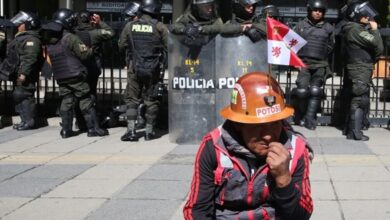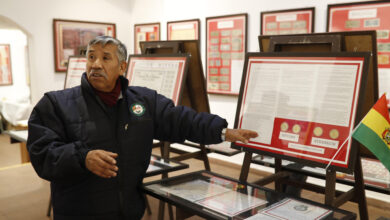Coronavirus and social classes in Latin America
In the upper classes of some countries the first cases were manifested, to later expand among the low-income population

Signs and search for culprits among the social classes for the arrival of the coronavirus are a constant in Latin America. / Photo: Pexels – Anna Shvets
LatinAmerican Post | Moises Campos
Listen to this article
Leer en español: El coronavirus y las clases sociales en Latinoamérica
It is a pattern that has been repeated in all the countries of the region: an upper-class person travels to the areas where the main sources of infection occur, returns and does not take due care, spreading the coronavirus to everyone with whom he deals, including domestic helpers, who in turn will take it to their places of residence, where social isolation measures are more difficult to comply with, and where, of course, they are more exposed to its ravages, given the conditions in which most of the region's public health systems are.
On the road spreading the coronavirus
In different Latin American countries there is a perception that the coronavirus came because of the upper classes, whether from businessmen, artists, politicians or athletes, who did not sacrifice parties or attendance at events in countries where the risk of contagion already existed. In this way they became propagators of the coronavirus in their countries of origin since in most cases they did not comply with the isolation suggestions or simply did not notify their situation.
So much so, that in Uruguay they are planning to bring to court a renowned designer, who was in Spain when there were already victims of the coronavirus, and when she returned she attended a social event, as usual, estimating that she was contagious in that single opportunity to 40 people, so she can be charged with negligence.
Making the coronavirus a matter of social class
In Brazil, one of the hardest-hit countries by the coronavirus, and one in which it took the longest to take effective measures, it is considered that the virus's gateway to the country was through an exclusive club, where only the wealthiest they have access, and from there it spread.
These cases have caused several left-wing politicians to want to turn the coronavirus into a weapon to encourage class struggle, reaching the extreme of a Mexican politician who assured that the poor were immune to the virus, since they do not have the possibility to travel. This is to overlook that the virus will inevitably descend the entire social scale, and that it will be precisely in the lower classes where it will hit hardest since they depend on inefficient public health systems.
In the upper classes there is the possibility of being able to carry out an early diagnosis, they can pay for private clinics that are better equipped than public healthcare centers and do not depend on the social security system, inefficient and not prepared to face this type of emergency. The coronavirus in Latin America can become a triggering factor that drives painful changes in the region.
Also read: COVID-19 baby boom? This new study suggests perhaps not
The difficulties of confinement in Latin America
In the case of the confinement recommended to prevent the spread of coronavirus, in Latin America it is also difficult since in popular areas it is almost impossible to implement it, given the agglomeration of people and a certain tendency to anarchy and disorder.
Pointing to a certain social class as the cause of contagion is counterproductive and a way of avoiding responsibilities. And left-wing politicians and media should not use a situation like the current one to hold the rich accountable and victimize the poor. Politicians who are blaming the rich are actually putting the poorest classes in a more vulnerable position.
With these accusations, people who present symptoms will avoid going to be tested for the coronavirus, which will favor the virus spreading, causing more damage in the most disadvantaged population.




